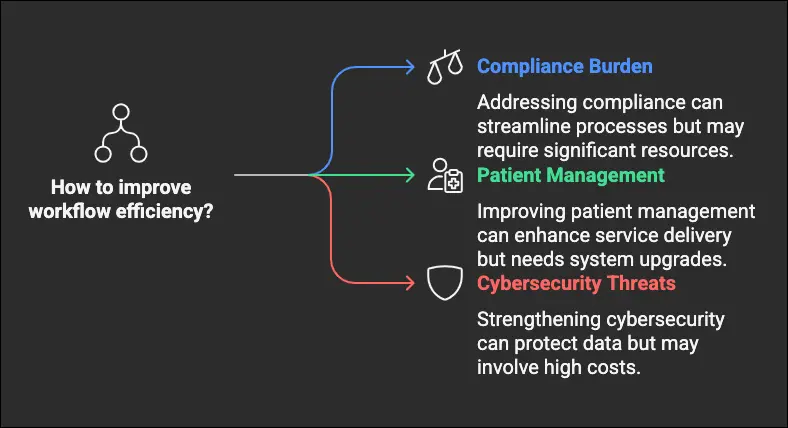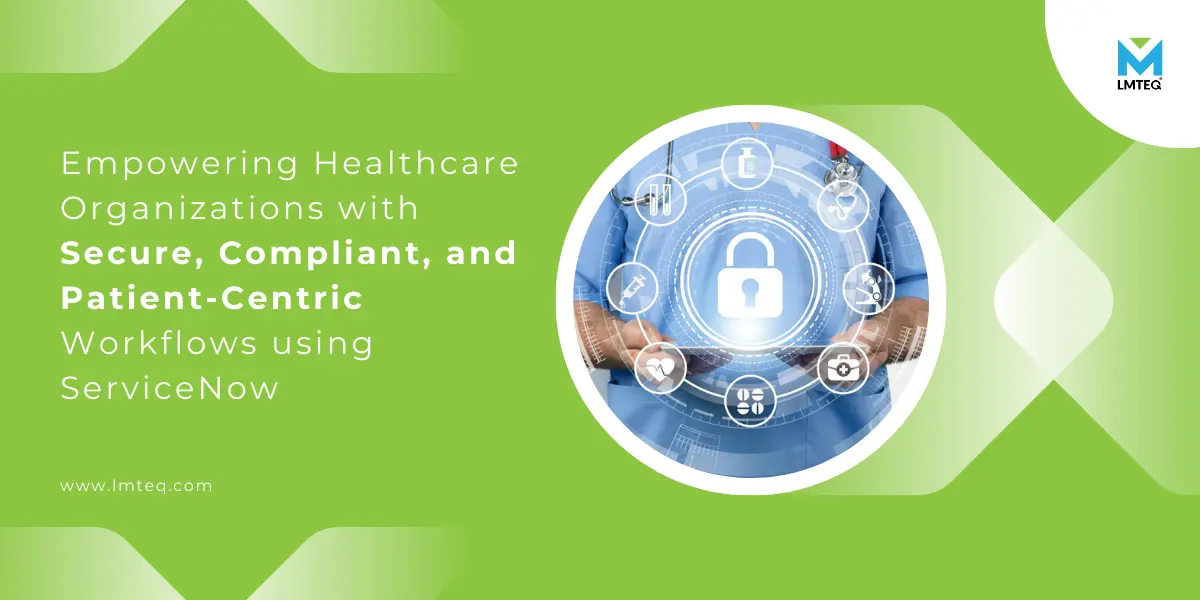The Future of Healthcare is Secure, Compliant, and Patient-Centric
Right now, healthcare organizations are under immense pressure to provide high-quality patient care while maintaining stringent regulatory compliance and ensuring data security.
The challenge?
Balancing these priorities with limited resources and increasing cybersecurity threats. This is where ServiceNow for healthcare automation steps in, enabling hospitals, clinics, and pharmaceutical companies to streamline workflows, automate compliance, and enhance patient experiences.
Why Healthcare Organizations Struggle with Workflow Efficiency

1. Burden of Compliance Regulations
- Regulatory bodies like HIPAA, FDA, and GDPR impose strict rules on patient data security and pharmaceutical processes.
- Compliance violations result in severe penalties, reputation damage, and legal consequences.
- Manual tracking of compliance often leads to errors and inefficiencies, making audits and reporting cumbersome.
2. Inefficient Patient Management
- Traditional methods lead to appointment scheduling delays, slow patient onboarding, and disjointed care coordination.
- Lack of real-time insights increases patient dissatisfaction and affects hospital efficiency.
- Fragmented systems result in redundant administrative tasks, increasing the workload for healthcare professionals.
3. Cybersecurity Threats in Healthcare
- The healthcare industry faces the highest number of cyberattacks due to valuable patient data.
- Ransomware attacks on hospitals disrupt critical services, putting patient safety at risk.
- A lack of centralized security frameworks makes healthcare organizations vulnerable to data breaches.
- Studies show that over 93% of healthcare organizations have experienced a data breach in the past three years, highlighting the need for robust cybersecurity solutions.
ServiceNow – Transforming Healthcare Workflows with Automation
Automating Compliance Management
ServiceNow’s compliance solutions provide a centralized compliance hub for tracking, reporting, and enforcing HIPAA and FDA regulations automatically.
Key Features:
- AI-driven compliance automation to minimize human errors.
- Real-time alerts for policy violations.
- Digital audit trails for regulatory reporting.
- Automated risk assessment for identifying compliance gaps.
- Integration with electronic health records (EHR) to enforce data security.
Real-World Example – A pharmaceutical company using ServiceNow for FDA compliance reduces manual validation errors in drug development, ensuring faster approval and market entry. By automating regulatory documentation, they improved compliance efficiency by 40% and reduced audit preparation time by 60%.
Enhancing Patient Engagement with Digital Workflows
Patient-centricity is at the core of modern healthcare, and ServiceNow enables organizations to automate patient journeys from admission to discharge.
How it Works:
- AI-powered appointment scheduling optimizes hospital resources.
- Automated patient onboarding with digital records.
- AI-driven virtual assistants answer patient queries instantly.
- Real-time status updates for patients, caregivers, and healthcare professionals.
Impact:
- Reduced waiting times and improved patient satisfaction.
- Healthcare staff spend less time on admin work and more on patient care.
- Studies indicate that digital patient engagement solutions can improve hospital efficiency by up to 30%.
Strengthening Healthcare Cybersecurity
ServiceNow’s risk and compliance management framework helps healthcare organizations proactively identify security threats and ensure regulatory adherence.
Key Features:
- AI-powered threat detection for real-time security alerts.
- Automated risk scoring for prioritizing vulnerabilities.
- End-to-end encryption for protecting patient data.
- Centralized compliance tracking to mitigate cybersecurity risks.
- Incident response automation to quickly address security breaches.
Real-World Example – A major hospital in the US using ServiceNow healthcare governance reduced data breaches by 40% through AI-powered threat analysis and automated compliance enforcement. The hospital also minimized IT response times for security incidents, reducing downtime by 50%.
Optimizing Healthcare Supply Chain Management
Beyond patient care and compliance, ServiceNow also streamlines procurement, inventory, and supply chain processes to ensure healthcare facilities have the right resources when needed.
How it Works:
- AI-powered demand forecasting prevents shortages of critical supplies.
- Automated vendor compliance ensures that only approved suppliers are used.
- Real-time inventory tracking minimizes waste and reduces costs.
Impact:
- Reduced stockouts of essential medical supplies by 30%.
- Improved financial efficiency with real-time cost tracking.
- Enhanced supply chain resilience against global disruptions.
The Future of Healthcare – A Secure, Automated, and Patient-Focused Ecosystem
The healthcare industry must evolve to meet growing compliance demands, cybersecurity challenges, and patient expectations. ServiceNow provides a robust platform to help healthcare organizations automate workflows, enhance security, and ensure seamless compliance with regulatory standards. By integrating AI, automation, and real-time monitoring, hospitals and healthcare facilities can provide safer, faster, and more efficient patient services.
Key Benefits of ServiceNow in Healthcare:
- Improved Compliance – Automated tracking of HIPAA, FDA, and GDPR regulations.
- Enhanced Patient Experience – Faster, AI-powered appointment scheduling and onboarding.
- Better Security – AI-driven risk management and proactive threat detection.
- Optimized Operations – Reduced administrative workload for healthcare professionals.
- Streamlined Supply Chain – Automated inventory and vendor compliance.
Frequently Asked Questions (FAQs)
1. How does ServiceNow help with HIPAA compliance automation?
ServiceNow automates HIPAA compliance by continuously monitoring security risks, enforcing access control policies, and generating real-time audit reports. It also helps healthcare organizations create audit trails for regulators.
2. Can ServiceNow improve hospital efficiency?
Yes. ServiceNow automates appointment scheduling, patient data management, and compliance tracking, significantly improving operational efficiency. It also reduces administrative workload by up to 40%, allowing healthcare professionals to focus on patient care.
3. Is ServiceNow beneficial for pharmaceutical companies?
Absolutely. It ensures FDA regulatory compliance, automates validation workflows, enhances drug safety tracking, and accelerates the approval process for new drugs, reducing time-to-market by up to 35%.
By leveraging ServiceNow, healthcare organizations can build a future-ready, secure, and patient-centric environment, ensuring compliance and efficiency in every aspect of healthcare operations.

